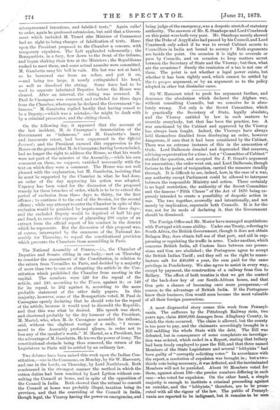Two debates have been raised this week upon the Indian
Con- stitution,—one in the Commons, on Monday, by Sir W. Harcourt, and one in the Lords, on Thursday, by Lord Northbrook. Both condemned in the strongest manner the method in which the cotton duties had been remitted by Lord Lytton without con- sulting the Council at home, and in spite of the opposition of the Council in India. Both showed that the refusal to consult the Council at home was probably illegal, taxation being its province, and that the overriding of the Council in India, though legal, the Viceroy having the power on emergencies, and being judge of the emergency, was a despotic stretch of statutory authority. The answers of Mr. E. Stanhope and Lord Cranbrook on this point were both very poor. Mr. Stanhope merely showed that the Duke of Argyll also had passed by his Council, and Lord Cranbrook only asked if he was to reveal Cabinet secrets to Councillors in India not bound to secrecy ? Both arguments are beside the point. On occasion it is right to overrule or pass by Councils, and on occasion to keep matters secret between the Secretary of State and the Viceroy; but then, what are the occasions ? Surely the remission of a tax is not one of them: The point is not whether a legal power exists, but whether it has been rightly used, which cannot be settled by the to quoque argument, or by an argument as to the policy adopted in other but dissimilar cases.


































 Previous page
Previous page